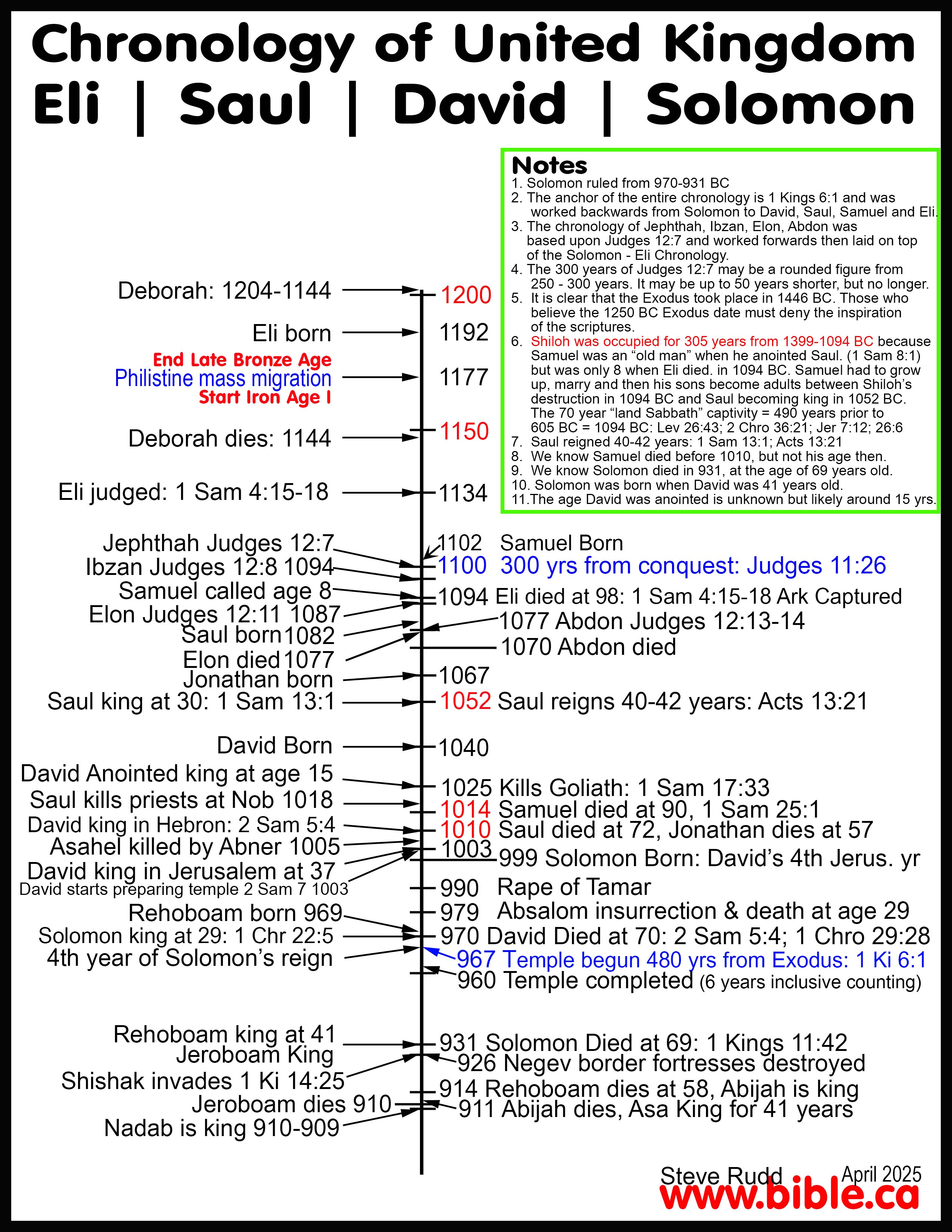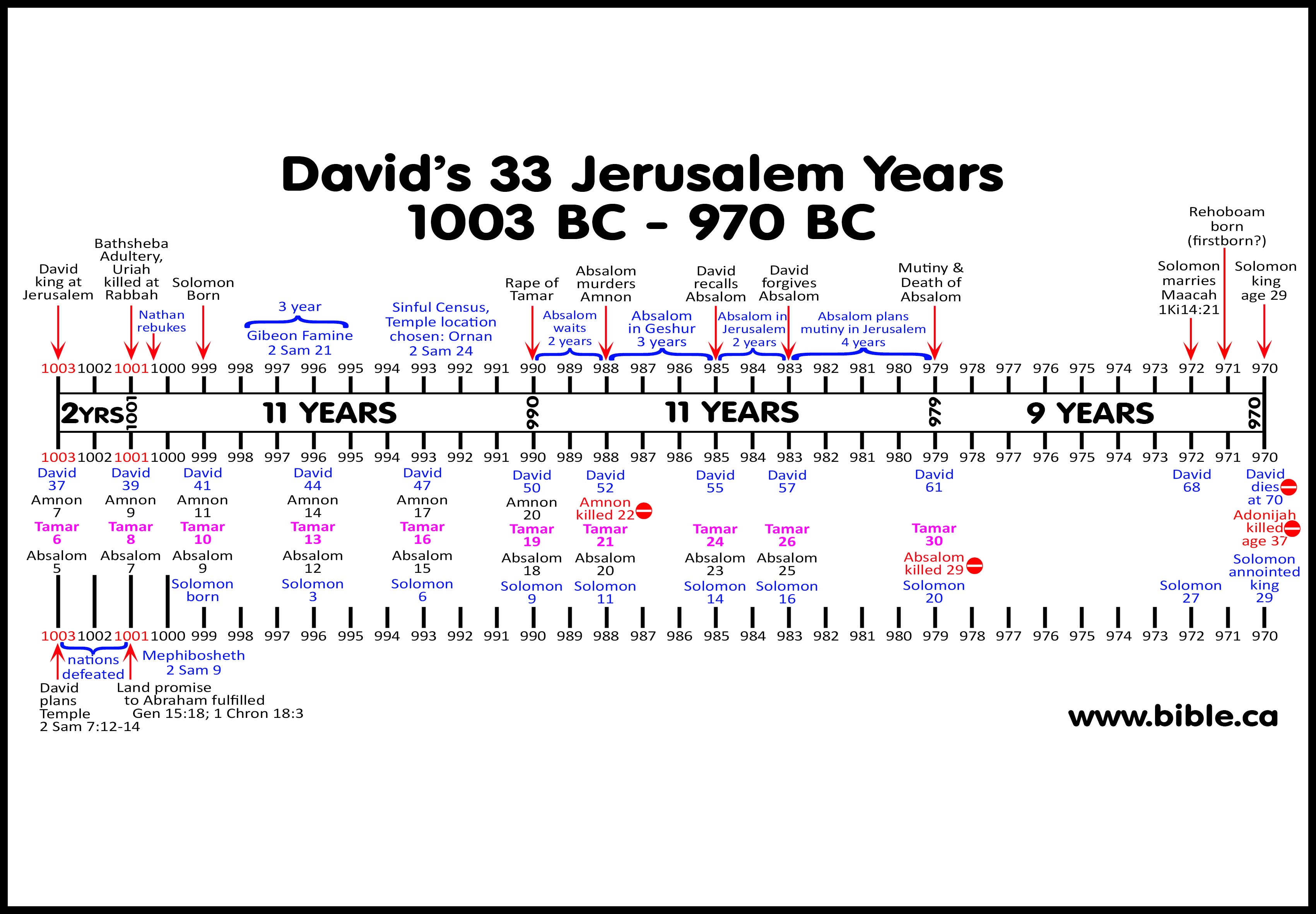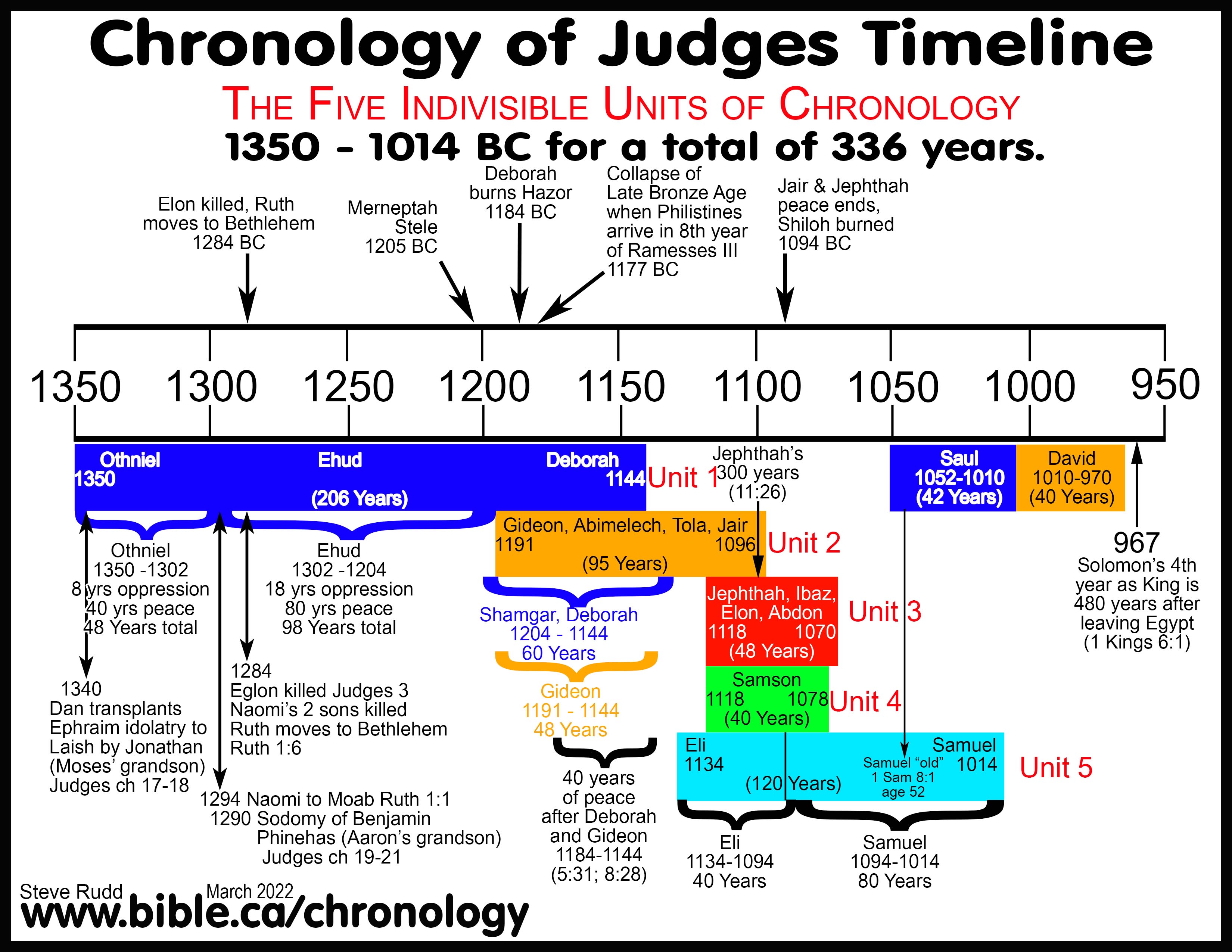David in Hebron:
1010-1003 BC
David's Civil War: 1005-1003 BC
After Saul dies there is Civil war between
The House of David and the House of Saul
David is 30-38 years old during this period.
(The first Divided Kingdom period: 2 years)
2 Samuel 2-5
“Then Abner
called to Joab and said, “Shall the sword devour forever?
Do you not know that it will be bitter in the end?
How long will you refrain from telling the people to turn back from following
their brothers?”
(Abner to Joab after Asahel, Joab's brother is killed: 2 Samuel 2:26)
“Now all the people took note of it, and it pleased
them,
just as everything the king did pleased all the people.”
(When David mourned for Abner, 2 Samuel 3:36)
“The LORD will return his blood on his [Joab] own head,
because he fell upon two men more righteous and better than he and killed them
with the sword,
while my father David did not know it:
Abner the son of Ner, commander of the army of Israel,
and Amasa the son of Jether, commander of the army of Judah.” (1 Kings 2:32)
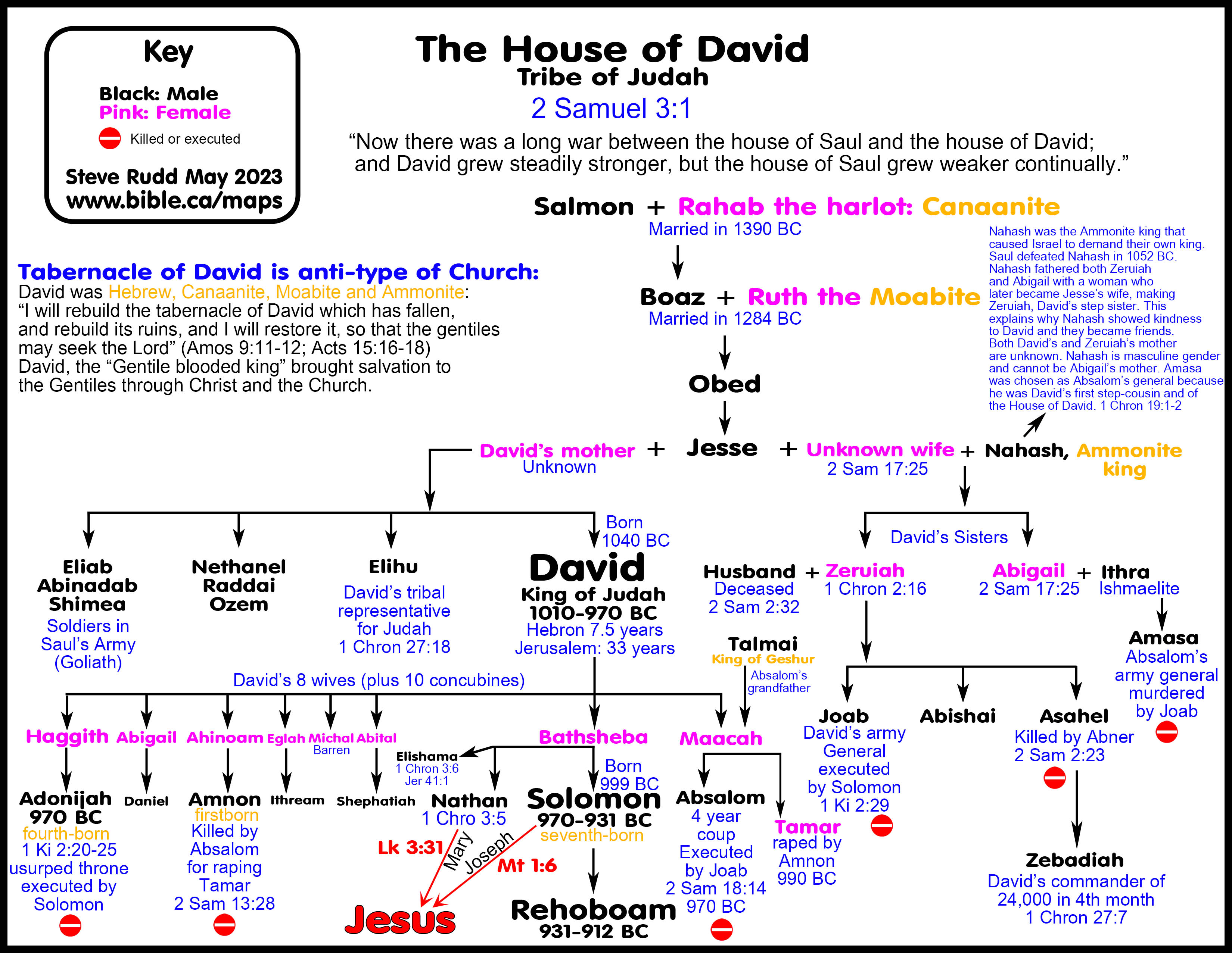
King David in Hebron: Civil War
Introduction:
1. This is document is part 4 in the series on Saul and David:
a. Part 1: Saul before David
b. Part 2: David in Saul's Palace: Saul, the psychotic king who drove himself insane
c. Part 3: Saul hunts David
2. Cast of characters in the civil war:
a. Saul: King of Judah and Israel who tried to kill young David until he died in 1010 BC.
b. David: King of Judah in Hebron 1010 -1003 BC and king of both Judah and Israel in Jerusalem in 1003-970 BC.
c. Joab: Wicked army commander of David during the civil was with Ish-bosheth until he was executed by Solomon after David died. David made two attempts to fire and replace Joab as his commander. First in the contest to sneak into Jerusalem to capture the city. Second, when Absalom usurped the throne and appointed Amasa as his army commander, this put Joab out of a job. But after Absalom was killed, David was not going to reappoint Joab as commander because his disobeyed David’s order to capture Absalom alive but instead appoint Amasa as his army commander (2 Samuel 19:13). Joab killed Amasa with betraying “Judas Kiss” (2 Samuel 20:9). After the death of Solomon, Joab betrayed David and Solomon by backing Adonijah, Solomon’s brother when he proclaimed himself king while David was on his death bed.
d. Ish-bosheth: Son of Saul, King of Israel who succeeded Saul, who caused the civil war with David 1005-1003 BC.
e. Abner: Righteous army commander of Ish-bosheth (Saul’s son) during the civil war with David 1005-1003 BC. Abner put Ish-bosheth into power but defected to David after he was falsely accused by Ish-bosheth. Joab assassinated Abner before he had a chance to deliver the 10 northern tribes to David. Ish-bosheth was killed soon afterwards and David made Abner his army commander. Joab allied himself with Adonijah, son of David, when he appointed himself as king as a pre-emptive strike to usurp the throne away from Solomon
f. Asahel: Brother of Joab whom Abner killed in the battle at Gibeon. Joab later killed Abner but David cursed him for this cold blooded murder of a righteous man.
g. Absalom: David’s usurping son who seized the throne in 979 BC for a few months. Absalom was a type of the Devil and was killed by Joab after his pretty hair caught in tree and left him entangled and tangling off the ground.
h. Amasa: The army commander of Absalom during the coup of David’s kingdom in 979 BC. After Absalom was killed by Joab, David was going to appoint Amasa as his army commander (2 Samuel 19:13). Joab killed Amasa with a Judas kiss as he was coming to Jerusalem after the coup ended.
i. Bathsheba: Wife of David, mother of Solomon who informed David that Adonijah had proclaimed himself king.
j. Adonijah: Son of David who proclaimed himself king while he was on his death bed with the allegiance of Joab who betrayed David. David spares his half-brother but is later executed when he asks Bathsheba to ask Solomon for Abishag, who lay with David on his deathbed to keep warm, to be his wife.
k. Abishag: Winner of the beauty contest to sleep with David to keep him warm. Adonijah was executed for asking her to be his wife after David died. She is the same Shunamite girl in the Song of Solomon whom Solomon unsuccessfully seduced. Instead Abishag married the shepherd boy she loved rather than Solomon who already had 80 wives.
l. Baanah and Rechab: Two brothers who served in high ranks of Ish-bosheth’s army under Abner. After Amber was assassinated, Baanah and Rechab then beheaded Ish-bosheth and brought it to David. David executed the two for the same reason he executed the Amalekite who brought him the head of Saul because they killed “God’s anointed”.
m. Abiathar: Last High Priest of the Eli line whom Solomon replaced with Zadok. This fulfilled the prophecy in 1094 BC that the house of Eli as high priest would come to an end.
3. Two Key Characters: Righteous Abner and Wicked Joab.
a. It may come as both a shock and a surprise that we are labeling David's army general "Joab" as wicked and Ish-bosheth's army general "Abner" righteous, but that is the truth.
b. We have righteous army general named Abner allied with the wicked king Ish-bosheth and a wicked army general names Joab allied with righteous David.
4. Twice David fired Joab as his commander:
a. When Abner defected from Ish-bosheth to David in Hebron, Joab murdered Abner against the wishes of David, who then pronounced two separate curses upon Joab and his household for the assassination.
b. Most get so excited over exactly how Joab snuck into Jebus (Jerusalem) through the water channel, they miss the fact that David had just put Joab's job as army commander up for grabs as a diplomatic way of firing him. To David's horror, Joab won his job back, even though others would have entered the competition for such a lucrative job.
i. It reminds me of the story that I took an unwanted male piglet I had recently acquired to a party and then had a pig naming contest. 75 people filled in their choice of name on a paper. When I read the names out everyone cheered for their choice. The winner was clearly "Sir Hamlette". I then surprised everyone with the news that the winner of the piglet naming contest, also won the piglet! To my horror by daughter was the winner! Just couldn't get rid of that unwanted Piglet, just like David couldn't get rid of Joab.
c. When David's son Absalom usurped his father's throne, Absalom fired Joab and replaced him with Amasa as his army commander. After Absalom was killed by Joab, it is quite puzzling why David chose to keep Amasa as his new army general… until you keep in mind that David did not want Joab to be his army commander. Joab then murdered Amasa to get his job back.
d. David had already instructed Solomon to find a way to execute Joab: (1 Kings 2:5-6) After David had appointed Solomon as his successor on his deathbed, Joab allied himself with Adonijah when he appointed himself as king as a pre-emptive strike to usurp the throne away from Solomon. This final act of rebellion against the wishes of King David was all Solomon needed to have Joab executed while he held the horns of the Alter in Gibeon. (1 Kings 2:28-35) “The LORD will return his blood on his own head, because he fell upon two men more righteous and better than he and killed them with the sword, while my father David did not know it: Abner the son of Ner, commander of the army of Israel, and Amasa the son of Jether, commander of the army of Judah.” (1 Kings 2:32)
e. With Joab executed, Solomon then replaced Abiathar, the last high priest in the line of Eli, with Zadok.
5. The setting:
a. Saul finally died and David is now able to finally take control of the kingdom as its sole monarch. However one son of Saul named Ish-bosheth, is proclaimed king and for two years ruled everywhere except Judah while David was king in Judah.
b.
The Ark of covenant is at Kiriath-jearim
and the Mosaic Tabernacle is at Gibeon.
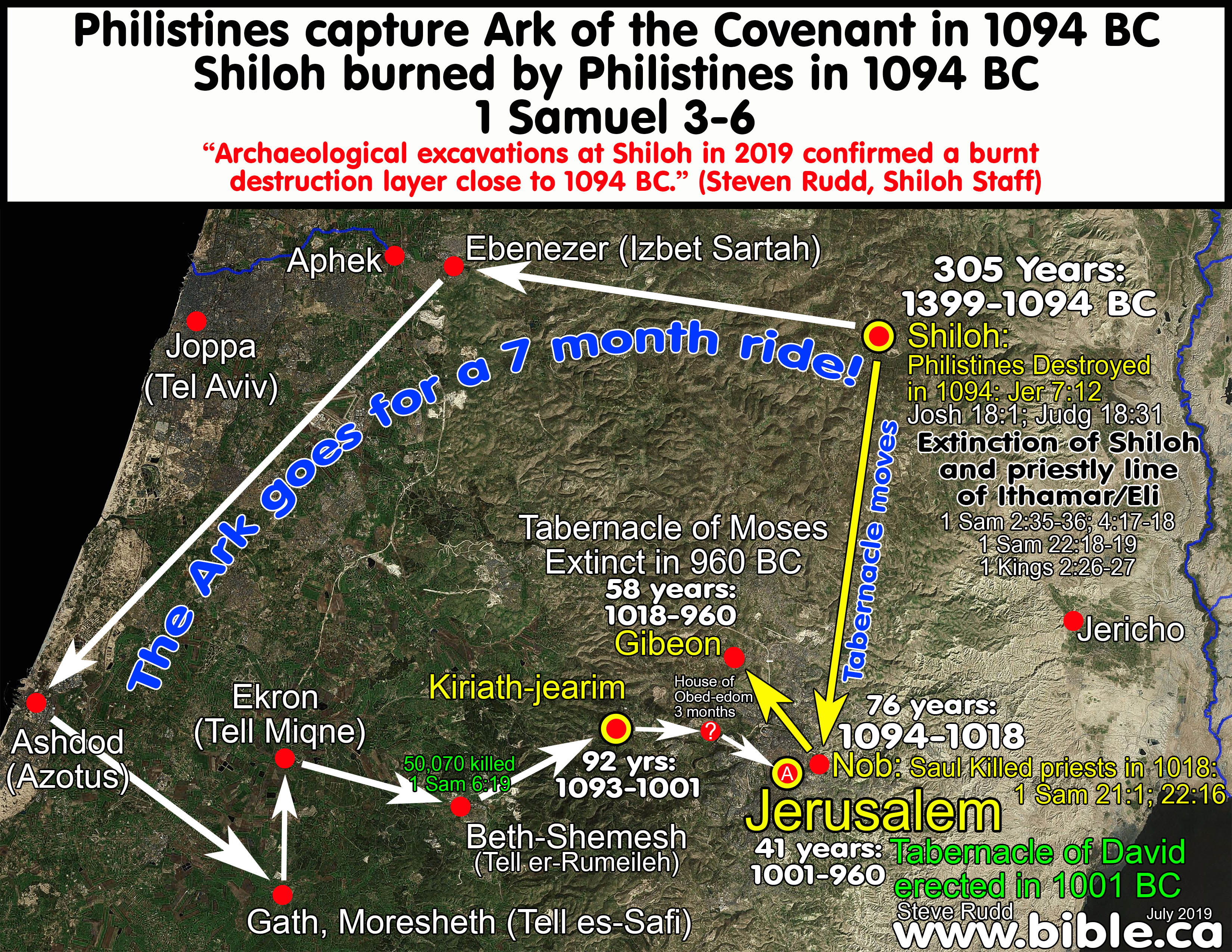
c.
Here is a panorama view of Gibeon from
the top of Ramah, where Samuel lived and oversaw the Mosaic Tent of Meeting
from 1018-1014 BC until he died. Saul had killed the priests and none
officiated during this period. The tabernacle of Moses would remain in Gibeon
until it is taken down after it is replaced by the new tabernacle of David in
Jerusalem. Once the Temple is built by Solomon, this tabernacle of Moses will
be put in a room inside the Temple for storage where it vanishes from recorded
history forever.

d. There are still altars at Ramah (Samuel's), Bethel (Jacob’s Gen 35:1), Gilgal and at the two Levitical cities of Gibeon and Geba.
e. Saul’s royal palace is Gibeah of Benjamin, also called Gibeah of Saul. Gibeah is the first Royal city. David's royal city will be Jerusalem 7 years after Saul dies. Saul’s royal palace at Gibeah is the capital of Israel until he dies in 1010 BC.
f.
Here is a panorama from the top of Gibeah
of Benjamin where Saul's palace stood. You can clearly see Samuel's home at Ramah
5 km away.
![]()
g.
In 1967 King Hussein built his Jordanian
palace on the very spot that Saul's palace stood. Excavations of this site are
planned in the next few years. Past excavations have uncovered a large square
structure with corner towers that are believed to be Saul's palace. Gibeah is
also called the "second Sodom" because in 1290 BC (Judges 19:22), the
men of the city committed acts of sodomy and rape that closely parallels the story
of Sodom and Gomorrah in Gen 19. This is where the Levite priest had his
Bethlehemite wife raped and murdered and he cut her in pieces and sent her to
through Israel. The result was a call to war and the tribe of Benjamin was
almost wiped out, save 600 men. Saul was a descendant of those men and chose
Gibeah, his home town, as his Royal city. Echoing the woman being cut up 250
years earlier from this same spot, Saul cuts up oxen in pieces and sends them
throughout Israel as a call to war to defend the men at Jabesh-Gilead who were
under attack of Moab. This is how it looks today:

6. Timeline and chronology:
a. In 1082 BC, Saul is born.
b. In Jonathan is likely born around 1067 BC since he is Saul’s oldest son.
c. In 1052 BC, Samuel was 52 years old when he anointed Saul at age 30-year-old as king. 1 Sam 13:1
d. In 1040 BC, David is born when Jonathan is about 27 years old and Saul is 42.
e. In 1025 BC, Saul had been king for 27 years but had failed to obey God twice and is told another will replace him. (David)
f. 1025- 1018 BC: David’s time in the Saul’s palace at Gibeah of Benjamin: 7 years
g. 1018-1014 BC: David’s time on the run: 4 years.
h. In 1014 Samuel dies an old man, at 88 years old. 1 Sam 25:1. For about 4 years, Samuel can look down from Ramah where he lives and see the Tabernacle between 1018-1014 BC.
i. In 1010 BC Saul and Jonathan die.
j. Saul was 72 years old when he died
k. Jonathan was 57 years old when he died.
l. David was 30 when he began to reign as king in Hebron between 1010-1003 BC
m. In 1005 BC Ish-bosheth, Saul's son, is made king by Abner, who has been out of a job as army commander ever since Saul died 5 years earlier. This is the beginning of the divided kingdom period for two years when David ruled Judah and Ish-bosheth ruled the other 11 tribes.
n. In 1003 BC Abner and Ish-bosheth are killed, David then captures Jerusalem and begins his reign at age 37. He reigns in Jerusalem for 33 years.
o. In 999 BC, Solomon is born.
A. David becomes king in Hebron after Saul dies: 2 Samuel 2:1
1. David always asked God for specific direction for everything he did. Today we have scripture that provides a moral framework for our choices. This contrasts with Saul who rarely consulted God and therefore often brought a curse upon himself when he slaughtered the priests at Nob and then Gibeonites thinking he was doing well.
2. David, the man of peace, sends a message of peace and reconciliation to Jabesh Gilead because they buried their "hometown boy" after the Philistines killed him. It is likely that Saul's mother descended from one of the wives given to the Benjaminites after the tribe was nearly driven to extinction in 1300 BC after they would not repent of the Sodomy at Gibeah. (see Judges 19-20) David's kind words
3. Even though David made wise peace with those closely allied with Saul, trouble was soon to follow because evil will never rest.
B. The House of Saul causes trouble for David: Ish-bosheth made King over Israel: 2 Samuel 2:8
1. We often speak of the united kingdom vs the divided king periods of Israel's history. In fact, the first divided kingdom period was the two years Ish-bosheth was king of Israel and David was king of Judah.
2. Ish-bosheth is Saul's youngest son whom Abner made King at age 40.
3. Abner, Saul's cousin and army commander while Saul was alive, took Ish-bosheth and made him king in rebellion to the known will of God that David was the rightful successor to Saul. Abner is actually a righteous man., but he started off putting tribal allegiances over God's will. Why? No doubt the wicked slander Saul had been spreading about David. After all, it was Abner who lead the hunt for David at the bidding of Saul who painted David as an evil person. (see Saul hunts David).
a. Shimei's wildly incorrect view of David likely had its origin in Saul's slander: “Thus Shimei said when he cursed, “Get out, get out, you man of bloodshed, and worthless fellow! “The LORD has returned upon you all the bloodshed of the house of Saul, in whose place you have reigned; and the LORD has given the kingdom into the hand of your son Absalom. And behold, you are taken in your own evil, for you are a man of bloodshed!”” (2 Samuel 16:7–8)
b. Abner was able to see through this when Ish-bosheth very unwisely made a false accusation against Abner sleeping with his fther's wife.
4. It is interesting that Abner took and made Ish-bosheth king in the transjordan city of Mahanaim and not Gibeah of Saul. This is a puzzle. Why would the son of Saul not be crowned king in the first royal city and the palace of his father Saul? We don't know why, but perhaps the palace was destroyed. What we do no, is that Gibeah of Saul is never again used as a place of any kind of importance again after Saul dies. There are only two references to Gibeah of Saul after the death of Saul:
a. When David hung 7 of Saul's relatives at Gibeah of Saul, in revenge for Saul's killing of the Gibeonites: 2 Samuel 21:6
b. In 730 BC when Isaiah simply mentions it poetically: Isaiah 10:29.
c. The final reference to Gibeah in the Bible invokes the memory of the sodomy of 1300 BC before Saul was born (Judges 19) Hosea 9:9-10
5. The transjordan city of Mahanaim was about 10 km south of Jabesh-Gilead, the tribal origin of Saul's grandmother or great-grandmother who was given to the Benjaminites so the tribe could continue (Judges 19).
a. Mahanaim had an ancient connection with Jacob as being a place where Jacob saw angels: “Now as Jacob went on his way, the angels of God met him. Jacob said when he saw them, “This is God’s camp.” So he named that place Mahanaim.” (Genesis 32:1–2)
b.
Later, David would seek refuge in
Mahanaim during the coup of Absalom. “Then David came to Mahanaim. And Absalom
crossed the Jordan, he and all the men of Israel with him.” (2 Samuel 17:24)
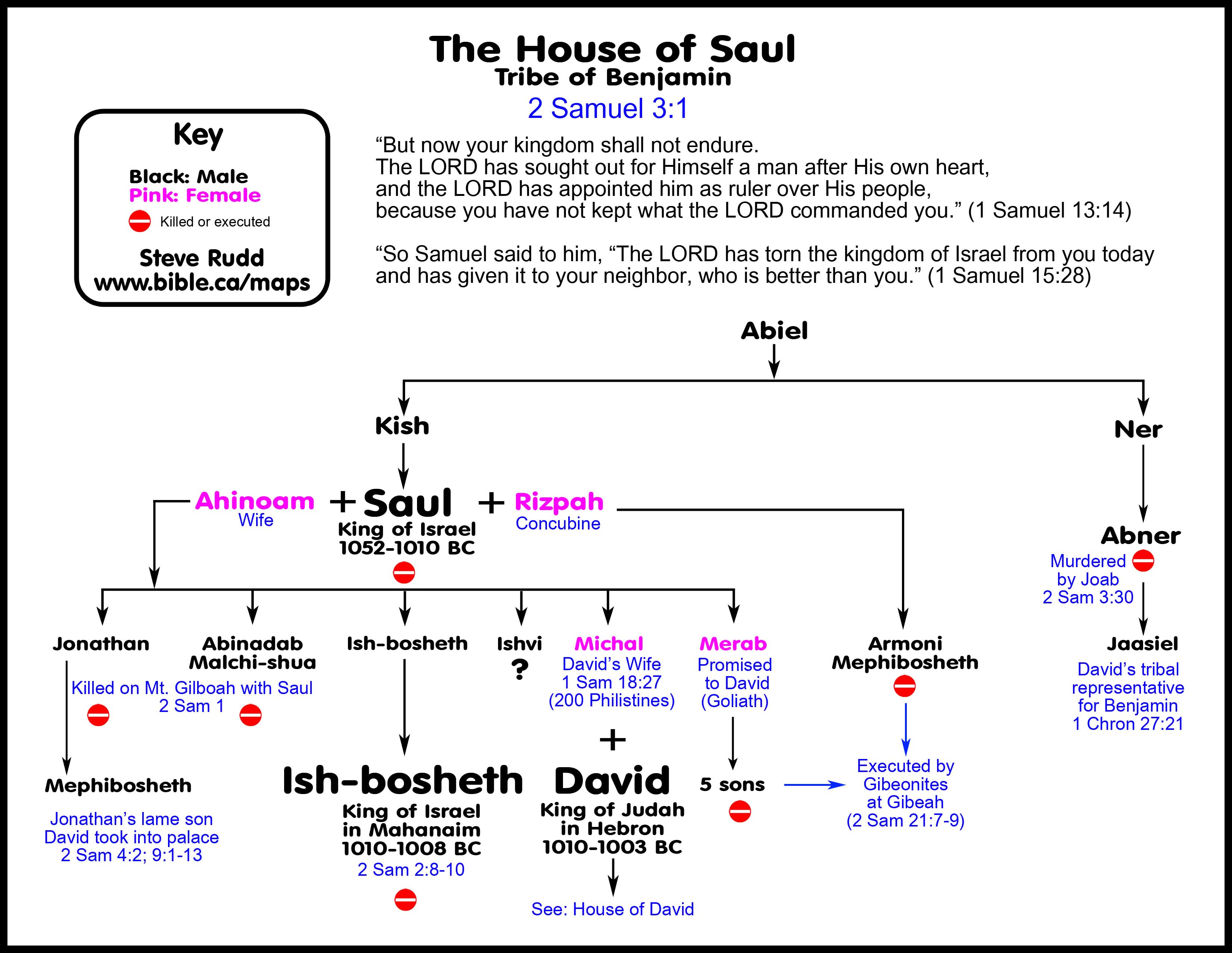
C. The battle of Abner and Joab at the pool of Gibeon: 2 Samuel 2:12
1. Abner was Saul's army general and Joab was David's army general.
2.
Abner was Saul's cousin and Joab was David's nephew: David's sister's
(Zuruiah) son.

3. The battle at the pool of Gibeon:
a. “And Joab the son of Zeruiah and the servants of David went out and met them [Abner and the servants of Ish-bosheth] by the pool of Gibeon; and they sat down, one on the one side of the pool and the other on the other side of the pool.” (2 Samuel 2:13)
b. Archeology has given us a rich historical view of the actual pool at Gibeon: See study of Gibeon.
c.
You can imagine Joab and his soldiers sitting
with his feet dangling over the edge of the pool on one side and Abner with his
soldiers sitting on the opposite side! This is the photo of when the pool of
Gibeon was first excavated in 1956-1960 by J. B. Pritchard. Here is an
excavation photo:
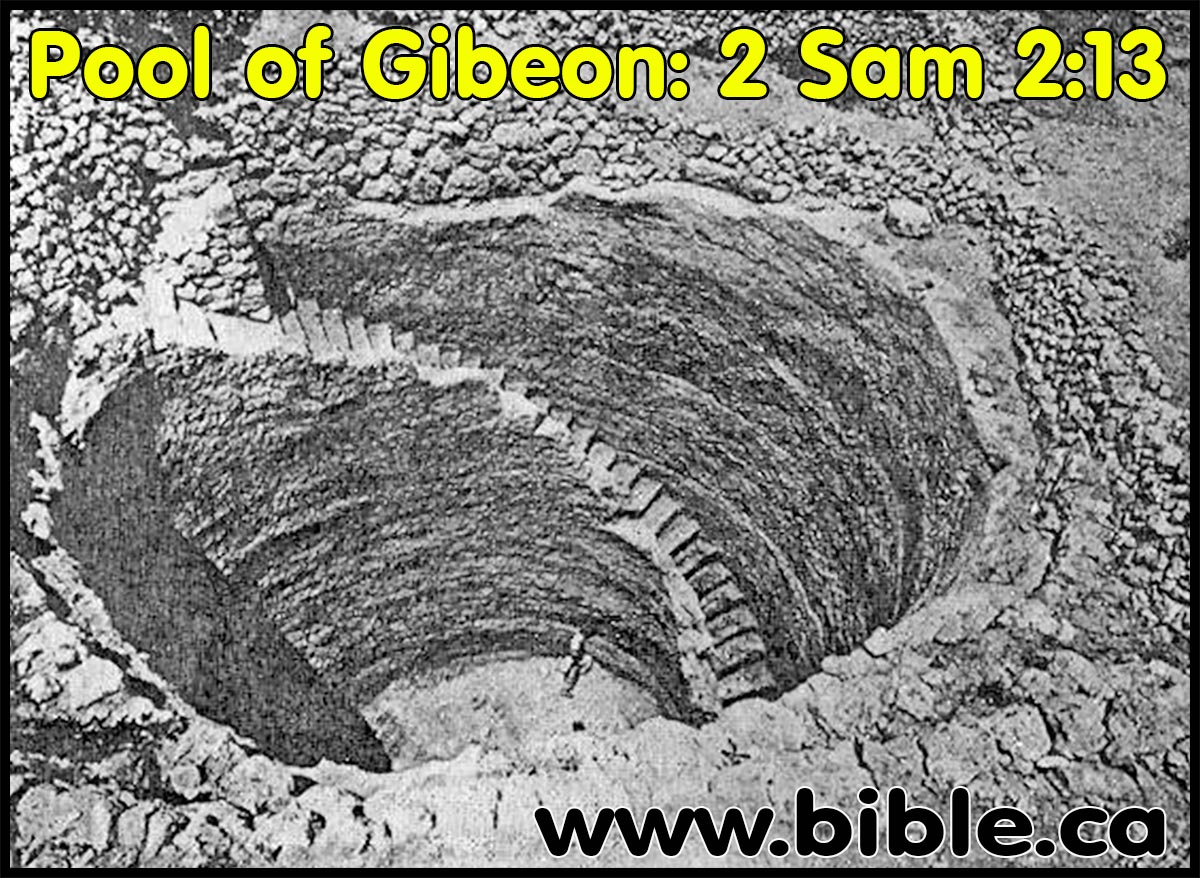
d.
In 2 Samuel 2:12–16, Abner challenges
Joab to a battle challenge where each side would choose 12 soldiers who line up
and face each other. After a one, two, three, GO command, each grabs his
opposite opponent by the hair and runs the other through with his sword,
killing all 24 soldiers at the same time. This may be where they got the idea
in the Battle of 1812, where the Red coats would line up in rows against the
Blue coats and when the command was given, each fired at his opponent across
the way, killing all soldiers in both front lines. Kind of dumb and senseless.
The native Indians fighting on the Canadian side changed all this when they
ambushed the American troops, contrary to established battle methods. The USA
and Canada have only had one war against each other and the Canadians
"wamped" the USA, forcing them to retreat and who have never had the
courage since to fight Canada. The Americans are taught a false and partial
history of the battle of 1812 and often protest at the truth that they lost the
war. If they had won the war, Canada would now be part of the USA! In fact,
Canada owned all the land for 100 miles south of the Great Lakes but decided to
make the border in the middle of the lakes because of the strategic protection
these large lakes provided against any future USA aggression. Fortunately,
Canada invented the telephone, Lacrosse, Hockey, Basketball and insulin and
peace has existed between the two great nations ever since! But I digress…
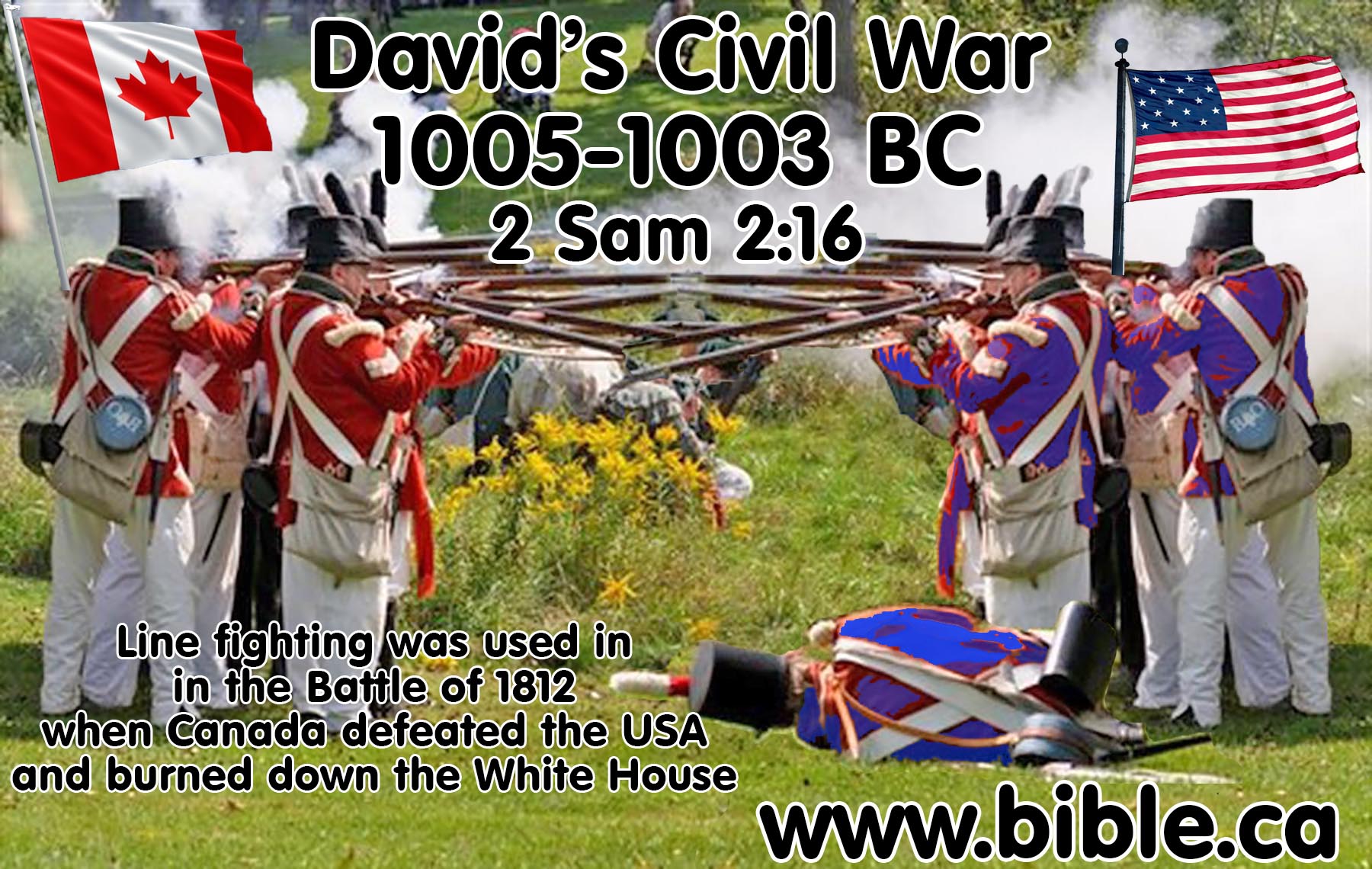
e. After the 24 soldiers were killed in the challenge, a great battle broke out between David's army and Ish-bosheth's army.
f. Asahel was Joab's brother and his mother was Zeruiah the sister of David. He began to chase Abner. Now the story that follows is in great detail in the Bible. The reason for the extra detail, is to show that Abner was a righteous man who warned Asahel twice to stop chasing him before he thrust his spear backwards killing Asahel in self-defense. Later, Joab would murder innocent Abner and David pronounced a curse on Joab, who was later killed himself. 2 Samuel 2:21
g. After Asahel is killed the entire battle stops and the soldiers on both sides stand and look at the corpse. Abner then takes the moral initiative to offer a cease fire: “Then Abner called to Joab and said, “Shall the sword devour forever? Do you not know that it will be bitter in the end? How long will you refrain from telling the people to turn back from following their brothers?” (2 Samuel 2:26)
h. Abner's words are wise and show that war is not a good solution to any problems and people die. Joab blames the death of his brother Asahel on Abner because he is the one who initially made the "battle of 1812" challenge at the pool of Gibeon. Joab then blows the trumpet in formal ceasefire and both armies return home.
i. Nineteen of David's men were killed in the battle and 360 of Abner's men were killed in the battle.
j. Abner returns to Mahanaim and Joab returns to Hebron.
k. After this there was long and continued civil warfare during the two years Ish-bosheth was king of the 11 northern tribes (the ten, plus Benjamin)
4. Below are actual photos of the pool of Gibeon that can be seen today! This is an amazing proof from archeology that the Bible stories are true and real history!
a.
This is the photo of when the pool of
Gibeon was first excavated in 1956-1960 by J. B. Pritchard. Here is an
excavation photo beside a recent photo:


b.
"J. B. Pritchard’s excavations at
el-Jib in 1956, 1957, 1959, and 1960. Included among the finds were thirty-one
jar handles inscribed with the name “Gibeon” (gbʿn) in ancient Hebrew
script" (ABD)
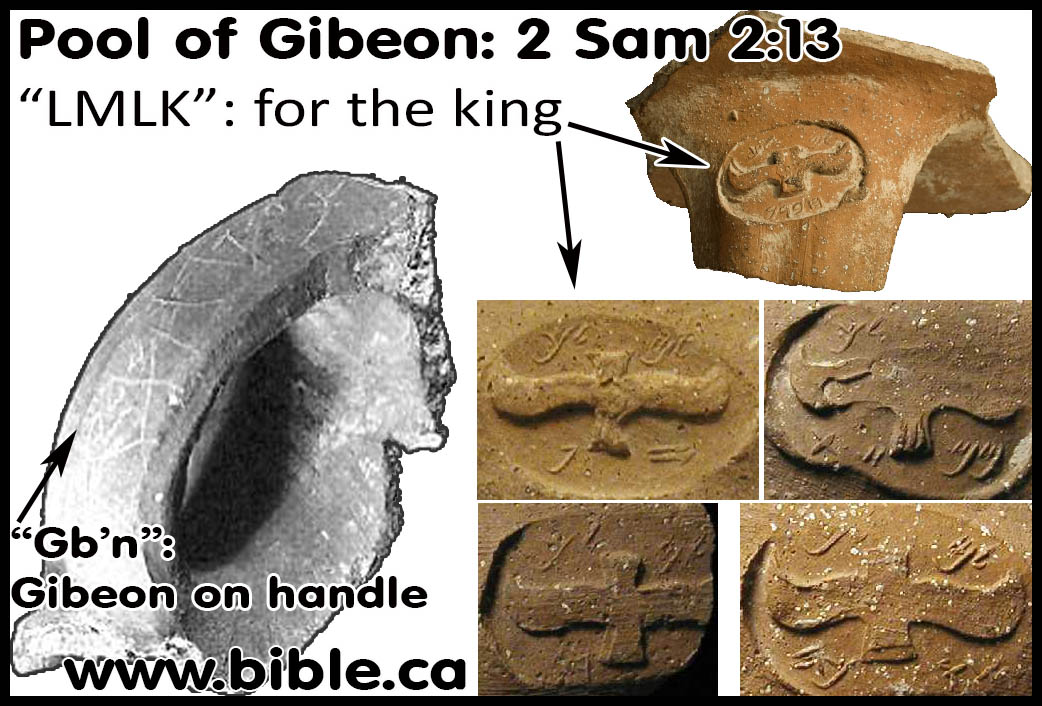
c.
The snail-like appearance of the spiral
staircase goes underground and continues to the water source deep underground:
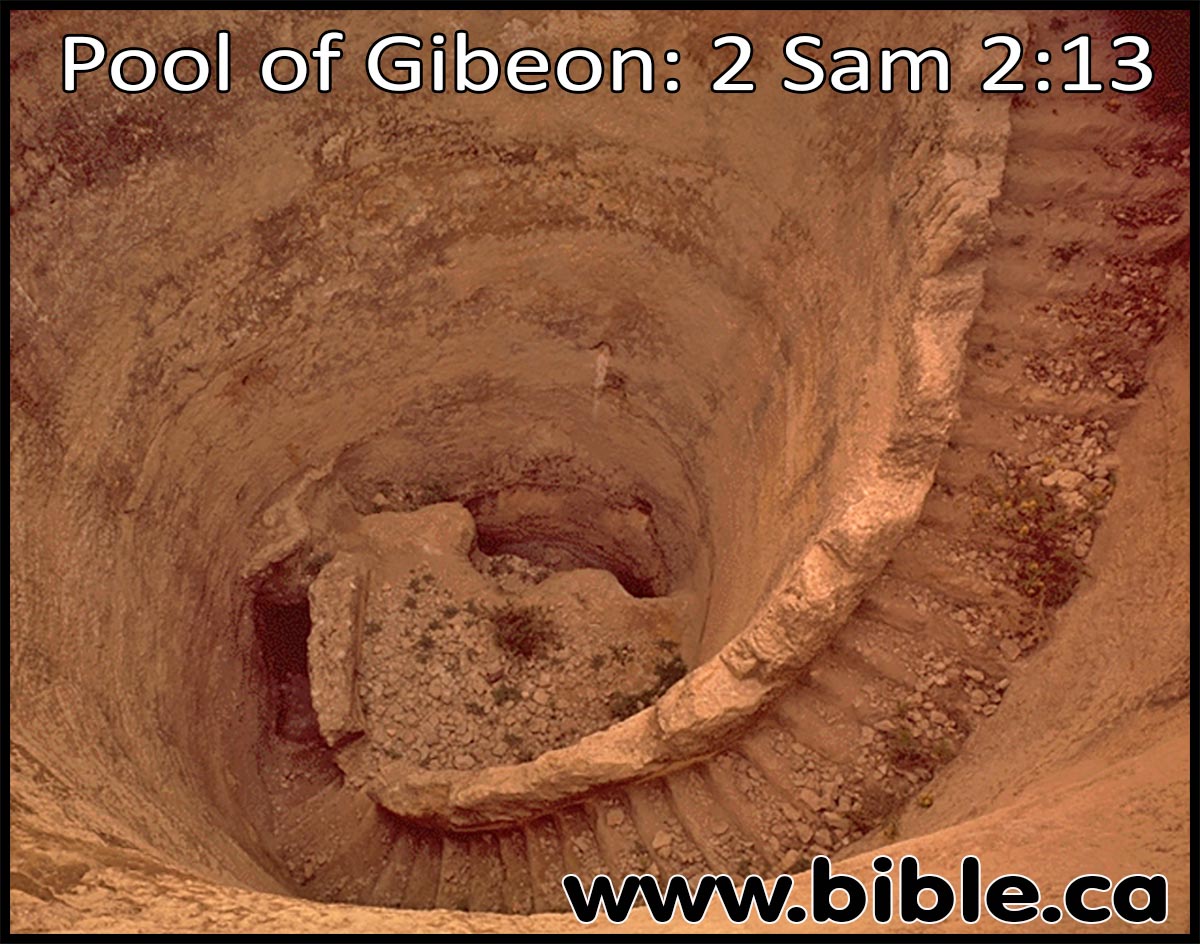
D. Abner falsely accused, defects to David: 2 Samuel 3:6
1. Every decision of Saul while he was alive and those of his household, including Ish-bosheth, was stupid or unwise.
a. Saul twice directly disobeyed God's commands and made an edicts that resulted in him trying to execute his righteous son Jonathan, when he ate the honey. Saul was king, but he was as "dumb as an ox".
b. This stupidity seemed to run in the family when Ish-bosheth falsely accused Abner, the very one who not only made him king, but kept him in power, of sleeping with one of his father's wives.
2. Ish-bosheth accused Abner of sleeping with his father's concubine, Rizpah, an otherwise unknown woman until this event.
3. Why would Ish-bosheth accuse Abner of this capital crime?
a. Men would sleep with the wives of a dead king, as a way of proclaiming themselves as king. Ish-bosheth may have actually believed this to be true or it may have been a deliberate false charge in order to have Abner killed.
b. Abner was in fact more powerful than the king. Abner was the one who made Ish-bosheth king. Abner also was the army general in control of the entire army.
c. Most likely, the paranoia that plagued Saul towards perfect David, became a family tradition with his son Ish-bosheth towards Abner.
4. Abner was a great man who was as wise as he was righteous and therefore knew Ish-bosheth was looking for ways to have him killed to satisfy his own paranoid insecurities.
5. Abner's reply tells us a huge amount of information: “Then Abner was very angry over the words of Ish-bosheth and said, “Am I a dog’s head that belongs to Judah? Today I show kindness to the house of Saul your father, to his brothers and to his friends, and have not delivered you into the hands of David; and yet today you charge me with a guilt concerning the woman. “May God do so to Abner, and more also, if as the Lord has sworn to David, I do not accomplish this for him, to transfer the kingdom from the house of Saul and to establish the throne of David over Israel and over Judah, from Dan even to Beersheba.” And he could no longer answer Abner a word, because he was afraid of him.” (2 Samuel 3:8–11)
a. First, Abner knew Ish-bosheth wanted him beheaded: "Am I a dog’s head that belongs to Judah?"
b. Second, Abner knew the only reason Ish-bosheth was king at all, was because Abner not only made him king in the first place, but also fought to protect him from David. Abner knew he had the power in his hands to turn Ish-bosheth over to David. This is likely why Ish-bosheth feared Abner, without cause, and made the false accusation.
c. Abner was fully aware that God had sworn an oath to David to be king, not Ish-bosheth.
6. If Abner knew God had chosen David to be king, why did he rebel and make Ish-bosheth king and stand by his side for two years?
a. Abner was Saul's army general for many years. He was the one who led the hunt for David, nearly capturing him once.
b. Saul had likely spread a large amount of slander and false rumors about how wicked David was.
c. Shimei's wildly incorrect view of David likely had its origin in Saul's slander: “Thus Shimei said when he cursed, “Get out, get out, you man of bloodshed, and worthless fellow! “The LORD has returned upon you all the bloodshed of the house of Saul; in whose place you have reigned; and the LORD has given the kingdom into the hand of your son Absalom. And behold, you are taken in your own evil, for you are a man of bloodshed!”” (2 Samuel 16:7–8)
d. Therefore, it is likely that Abner questioned David's righteousness but in time, learned that the house of Saul was worthless.
e. Abner's gradual comprehension that the house of David was blessed of God for good reason, and that the house of Saul was under a curse, for good reason, came to a head when Ish-bosheth trumped up the false charge for no reason at all.
f. Abner suddenly connected Ish-bosheth's narcissistic paranoia and false accusations against himself with Saul's psychotic slander against David years earlier.
g. Abner was a righteous man as seen in his double warning to Asahel before he killed him in self-defense, or be killed himself. David always viewed Abner as a righteous man.
h. Being a righteous man, he chose to defect to David. If he was unrighteous, he would have just killed Ish-bosheth right there and made himself king.
i. Abner walks down to Hebron and joins David!
7. The story of the defection of Abner to David is important because sometimes good and honest souls are aligned with wicked men. But in time, they see the light and break their ties with the Devil and his servants.
8. Abner comes to David and says: “Then Abner sent messengers to David in his place, saying, “Whose is the land? Make your covenant with me, and behold, my hand shall be with you to bring all Israel over to you.” He said, “Good! I will make a covenant with you, but I demand one thing of you, namely, you shall not see my face unless you first bring Michal, Saul’s daughter, when you come to see me.”” (2 Samuel 3:12–13)
a. David could easily have killed Abner, but was a man after God's own heart and a man of peace, not bloodshed.
b. David demands that Michel, his wife who had been given to another man by Saul, be returned to him. This illustrates the power of females who were the daughters or wives of kings. It is a paradox that Abner had been false accused of insurrection by sleeping with Saul's wife, and the first request David makes of Abner is to have Saul's daughter Michel, returned to him because of the symbolic significance that came with it as Saul's rightful successor to the throne. We know that good looking Michel was barren her entire life and was therefore a "sports model", but this is not likely why David wanted her back.
9. Abner agrees and begins his journey north to hand over control of the 11 northern tribes to David… but this will never happen because he is assassinated by Joab.
E. Joab ruthlessly murders Abner: 2 Samuel 3:26
1. Joab had always carried a grudge against Abner for killing his younger brother Asahel. However, we know from the story that Abner was being chased by Asahel and gave Asahel two warnings before killing him in self-defense, or be killed himself.
a. Joab may or may not have ever known these details.
b. It seems that he may not have, since the scripture goes into such specific detail to exonerate Abner in killing Asahel. Remember, 2 Samuel was written long after David died.
2. As David's longest serving and most trusted army general, Joab had long viewed Abner as an enemy.
a. Joab was an army general, not a king.
b. Joab lacked the larger insight of a king like David, to see that Abner could indeed be trusted as much as Joab.
3. When Joab learned that David had made peace with Abner, Joab rebuked David for his "naivety".
a. Instead of submitting the decision of the king, Joab took matters into his own hands in rebellion to the wishes of a king.
b. Joab was now doing what Abner never did to Ish-bosheth: disobey an decision of the king and murder Abner.
c. Joab was himself guilty of the very deception Joab had falsely accused of Abner to David.
d. Joab, in a way, made himself king over righteous David and killed Abner, who never considered usurping wicked Ish-bosheth.
4. It is clear from the narration, that Joab was serving himself in avenging his brother, in complete disregard to the greater good that might be accomplished by Abner's defection.
5. Had Abner lived and had a chance to peacefully deliver the 11 tribes over to David, it might have been done peacefully so that even Ish-bosheth might have not needed to have been killed.
6. When David learned Joab had executed of Abner, he pronounced a curse against the house of Joab: “May it fall on the head of Joab and on all his father’s house; and may there not fail from the house of Joab one who has a discharge, or who is a leper, or who takes hold of a distaff, or who falls by the sword, or who lacks bread.” (2 Samuel 3:29)
7. Joab's selfish act of revenge created three problems for David:
a. It removed a bloodless and peaceful path to David ending the civil war as king of all 12 tribes.
b. It created the appearance that David instructed Joab to murder Abner.
c. It created the appearance that David cannot be trusted when he makes an oath to someone. Saul broke his oaths countless times.
8. David is struck with genuine grief and personally follows the wake for Abner to his grave in Hebron.
9. David refuses to eat all day and the people took note with this amazing statement. If only this could be said about all our own personal conduct as others view it:
a. “Now all the people took note of it, and it pleased them, just as everything the king did pleased all the people.” (2 Samuel 3:36)
b. It was clear to the people that David did not order Abner's execution.
c. David proclaims a further curse upon his sister Zeruiah's two remaining sons, Joab and Abishai, who worked together to kill Abner.
10. In this story, we see the righteousness of Abner shining through and like Jonathan, met an unfair and unjust end to their lives.
F. Ish-bosheth turns coward and is killed: 2 Samuel 4:1
1. Upon hearing the news that Abner wasa dead, Ish-bosheth "lost courage, and all Israel was disturbed." This illustrates that he really wasn't king material in the first place for he was so dependent upon others to support him in the vacuum of his own lack of leadership.
2. After Abner was assassinated by Joab, it became clear to two of Ish-bosheth's army commanders, that it was time for them to flee in fear since they wrongly thought David ordered the execution of Abner, they would be next on the list! These two commanders were brothers named Baanah and Rechab.
a. “Saul’s son had two men who were commanders of bands: the name of the one was Baanah and the name of the other Rechab, sons of Rimmon the Beerothite, of the sons of Benjamin (for Beeroth is also considered part of Benjamin, and the Beerothites fled to Gittaim and have been aliens there until this day).” (2 Samuel 4:2–3)
b. According to Eusebius Onomasticon the town lay between Antipatris and Jamnia, but the Madeba Map places it between Beth-dagon and Lod. The name may appear in the Amarna Letters as Akk. Gamteti." (Eeardman's Bible Dictionary, Gittaim).
3. After army commander Abner was assassinated by Joab, Baanah and Rechab moved from Beeroth to Gittaim (lit: double wine press), they travelled over to the palace of Ish-bosheth at Mahanaim and killed him during his afternoon sleep.
4. The took the head of Ish-bosheth to David, unaware of their impending execution.
a. David reminded Baanah and Rechab of what happened when the Amelekite told David that he killed Saul, then had the two executed.
b. What is sad here, is that lies kill people. Had these two known that David did not order the murder of Abner, they might not have felt the need to flee to foreign town like Gittaim.
c. They killed Ish-bosheth in order to preserve their own lives, when that action is what got them both killed.
d. If David was a wicked king, he would likely have rewarded them and made them commanders in his army.
e. Righteous and wicked men think and act in very different ways.
5. It is clear that David actually thought that he could rule all 12 tribes and allow Ish-bosheth to live.
6. David was not happy when Jonathan was killed since he had agreed to serve David as his second in command. With Abner and Ish-bosheth dead, whether right or wrong, it now cleared the way for David to take control of the entire land and be the king of all the 12 tribes. The civil war was over.
a. “So all the elders of Israel came to the king at Hebron, and David made a covenant with them in Hebron before the LORD; and they anointed David king over Israel, according to the word of the LORD through Samuel.” (1 Chronicles 11:3)
F. David capture Jerusalem: 2 Samuel 5
1. David was 30 when he became king in Hebron and reigned 7.5 years. Then he reigned 33 years in Jerusalem.
2. Jerusalem was a Jebusite stronghold that had never been fully conquered by Israel.
3. David had taken the head of Goliath to Jebus (Jerusalem) for reasons unknown. However, it may have been a way to intimidate and warn the Jebusites for his eventual take-over of their city.
4. David promises: “Now David had said, “Whoever strikes down a Jebusite first shall be chief and commander.” Joab the son of Zeruiah went up first, so he became chief.” (1 Chronicles 11:6)
a. So although Joab was under a curse by David for killing Abner, he proved himself once again as an able warrior by sneaking into Jebus through the "water tunnel." 2 Samuel 5:8
b. The water tunnel would be either a freshwater channel of the Gihon Spring near its gate, or a sewer channel that came under the gate.
c. Pictured here is an example of just such a water tunnel for sewage at the recently discovered double gated Elah fortress which overlooks the Elah Valley where David killed Goliath.
d. Khirbet Qeiyafa (Elah fortress) Here is the south gate
facing the Elah Valley in which David killed Goliath. There are two gates at
Qeiyafa: a southern facing gage pictured below and a western facing gate. Both
gates are standard Iron age "triple gates" that date from the time of
Saul and David. Although the Jebusite city of Jerusalem was much older, it is
likely that the water channel that Joab used to sneak into the city was like
this. These water channels was used for sewage and were common constructions
for both cities and fortresses.

e. Here is the same gate looking from the outside, notice
the opening for the sewage that runs under the entire triple gate structure.

5. Hiram, the king of Tyre sent cedar and skilled labourers in stonework and woodwork to build david a palace. Archeologically, then David's palace would be of the same design at that seen in Ancient Tyre.
6. The Philistines attack David in Jerusalem (the valley of Rephaim is the south end of the valley of Hinnom: Joshua 15:8), but God strikes them with insanity and they likely start killing each other, like so many times in the past and David defeats them. It is interesting that the Philistines abandoned their idols where they were camped and David gathered them all up and hopefully disposed of them.
a. The signal was the sound of many men marching above the trees. This auditory miracle of God was similar to Gideon's 300 when he used the torches, trumpets and broken pots to trigger mass confusion among the enemy so they destroy themselves.
b. David then attacked and rid the land of Philistines from north of Jerusalem at Geba to west of Jerusalem at Gezer.
Conclusion:
1. David was king in Hebron for about 5 years before Abner made Ish-bosheth king and created the first period of the divided kingdom. In the last two years of David's reign in Hebron, Ish-bosheth was king of the 11 northern tribes at Mahanaim: 1005-1003 BC
2. We have righteous army general named Abner allied with the wicked king Ish-bosheth and a wicked army general names Joab allied with righteous David. In fact, David tried to diplomatically replace Joab when he offered his position as leader of the army to the man who was able to break into Jebusite Jerusalem through the water channel. Joab understood the rebuke, but also was truly a highly skilled commander and logistical soldier. When he won the contest, David had no choice but to give him his job back, but it must have been obvious to all that David was not really happy with Joab, especially since he was under a double curse by David for killing Abner. Although Joab Killed Absalom the usurper of David’s throne, David never reinstated Joab's Job but allowed Amasa to continue as as army commander (2 Samuel 19:13). This would be particularly bitter for Joab, since Absalom replaced Joab with Amasa as his army commander when he usurped David’s throne. Joab finally went on to murder innocent Amasa! When David was on his death bed Joab allied himself with David’s other son Adonijah instead of Solomon. David instructed Solomon to find a way to execute him. "Now you also know what Joab the son of Zeruiah did to me, what he did to the two commanders of the armies of Israel, to Abner the son of Ner, and to Amasa the son of Jether, whom he killed; he also shed the blood of war in peace. And he put the blood of war on his belt about his waist, and on his sandals on his feet." (1 Kings 2:5). Joab was executed by Solomon for his insurrection and disloyalty: 1 Kings 2:28-35. ““The LORD will return his blood on his own head, because he fell upon two men more righteous and better than he and killed them with the sword, while my father David did not know it: Abner the son of Ner, commander of the army of Israel, and Amasa the son of Jether, commander of the army of Judah.” (1 Kings 2:32)
3. David did his best to navigate with peace, the foolish and dangerous vengeful hatred of Joab and the self-serving paranoid insecurity of Ish-bosheth.
4. In all of David's choices, everything he did pleased the people. He truly was the most righteous king Israel ever had.
5. The lesson for Christians is that we will suffer from the consequences of the poor choices of those around us. We need to be part of the solution, never the problem. This is what David did.
By Steve Rudd: Contact the author for comments, input or corrections.
